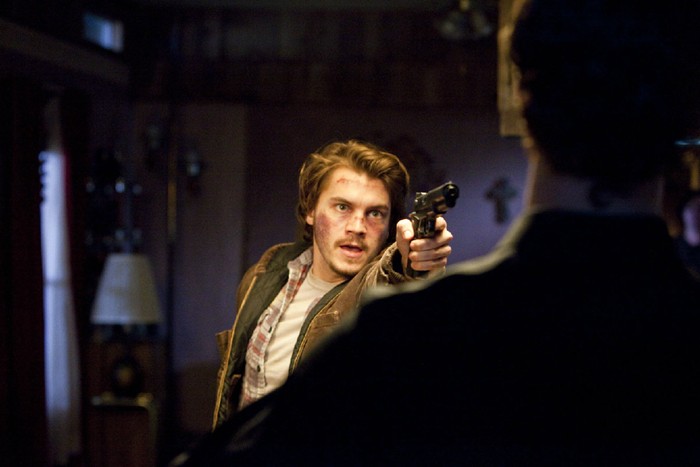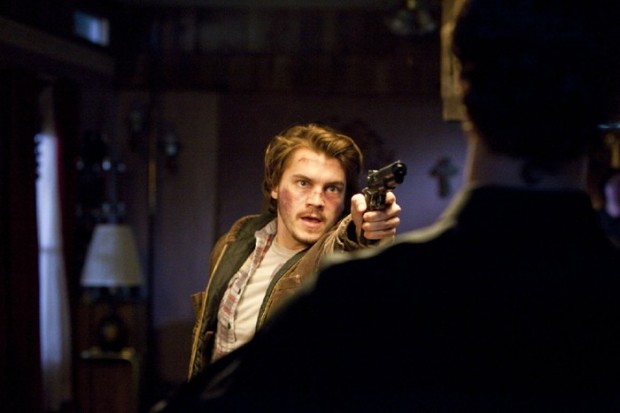
Killer Joe isn’t going to appeal to everyone, but for those that like their comedy dark and dreary, there is few better options in modern cinema. Director William Friedkin has a reputation for making twisted films as of late, and his latest is no different. At SXSW earlier this year I had a chance to sit down with Emile Hirsch and Gina Gershon to discuss the film. Along the way we touched on the soon-to-be infamous chicken bone sequence, Friedkin’s insistence on single takes, getting down and dirty, and what kind of audience they want to see the film with. With the film now hitting limited release, check out our conversation below.
The Film Stage: The great thing about seeing this film in a festival setting is exactly what you were talking about – how the audience reacts. Do you think this is the kind of setting you want to see this kind of film in?
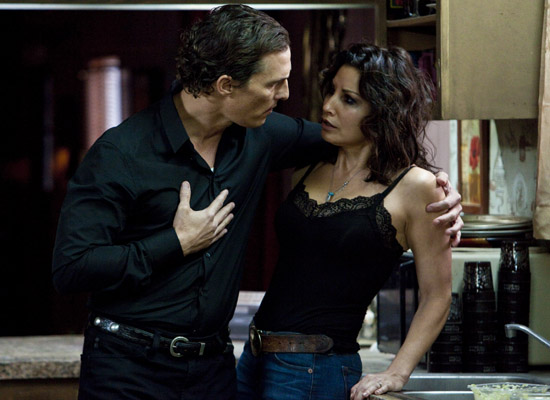 Gina Gershon: I think if you’re just a random person going to a movie theater, you don’t have anything at stake. You are here with other journalists or other people and your friends, so there’s kind of a…
Gina Gershon: I think if you’re just a random person going to a movie theater, you don’t have anything at stake. You are here with other journalists or other people and your friends, so there’s kind of a…
Emile Hirsch: Yeah, I think it’s a double-edged sword. I think you definitely get advantages of people who, like, want to be pumped. And then sometimes when you’re in the movie theater with a random audience it’s like there’s no pressure, so it’s like free for all. Like if you go to the premiere of The Hangover, I bet you people in the middle of nowhere laughed harder than at the premiere in a weird way. Because the premiere, it’s like agents checking their Blackberries.
GG: Well, I’d want to see it with the audience where people are yelling back at the screen – like, “Oh no, don’t do it! Oh shit!” [Laughs.] You know what I mean? I love that. “Don’t you eat that chicken bone.” [Laughs.] I think that would be the really super-fun audience, really random. But like I said, I’ve only seen it twice now with an audience and once alone, and the reactions have been so completely different – laughing in totally different places. When I watched it myself, I didn’t laugh – well, actually I did laugh out loud. I don’t remember because no one was there. [Laughs.]
EH: When Billy first showed me the movie I started hysterically laughing at the chicken bone scene. [Laughs.] And the laughter carried through to the fight, and then when the fight started, then I really started laughing hard. And maybe it was just an uncomfortable laugh, but it was hysterical, weird laughter.
GG: I have – you know, I think during the chicken bone scene, because we keep talking [about] it – every time I’ve seen it, I keep thinking, “Is it me?” But I think you have – because it was so visceral on the set, when we were killing you basically or beating the shit out of you – it was so intense. Every time we started to get to that chicken bone scene, my stomach cramps up. I literally start having this weird response that I remember I had that day. So I think it was such a visceral experience, and we only really lived through it once.
EH: But the memory lives on. It’s like dragging a dog back to the vet. [Laughs.] “Just through this little door, Rex.” [Laughs.] “No, no, don’t make me go.” [Laughs.]
I liked both of you just getting down and dirty – I mean, you look horrible by the end of the movie, and I think that’s brilliant to do that. Watching you was like watching Charlize Theron in Monster where she just, by the end of it, she just looks horrifying.
GG: I look pretty bad at the beginning of this movie, too. It’s okay, you can say it. [Laughs.]
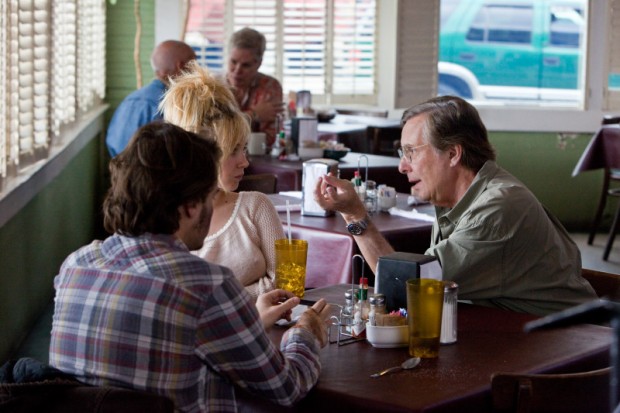
[Laughs.] Is it okay to talk about the opening shot of you?
GG: My fabulous merkin shot? [Laughs.] In fact, I’m insulted no one has brought it up yet. [Laughs.]
Well, I was going to ask you if that was a stunt merkin, but –
GG: No, it was a real merkin – that I helped design. [Laughs.] Well, you know what, in all seriousness, I think these people, what I love about them and what’s so gnarly about them, is that they’re really primitive. They’re very raw people. And so actually the merkin thing was a real discussion because Billy said, “Ah, you don’t need it, whatever…” But I wanted the biggest, wildest, craziest looking bush – sorry – because I just felt like these people, they’re not going to like go to the waxers, they’re not going to be groomed in that way. I wanted them to be like – they’re like wild animals to me. And plus it’s kind of a groovy look, you know? And it’s funnier, let’s face it. The bigger the bush, the funnier the laugh is going to be for some reason. It was like as big as his head. [Laughs.] Thank you for noticing. [Laughs.]
It was my pleasure. [Laughs.]
GG: [Laughs.] Yeah, but it’s funny, it’s supposed to be – it starts the movie off in a mocking, funny way.
You do look discombobulated, and then throughout you look more attractive. And then, by the end, both of you guys are just –
EH: Covered in blood. [Laughs.]
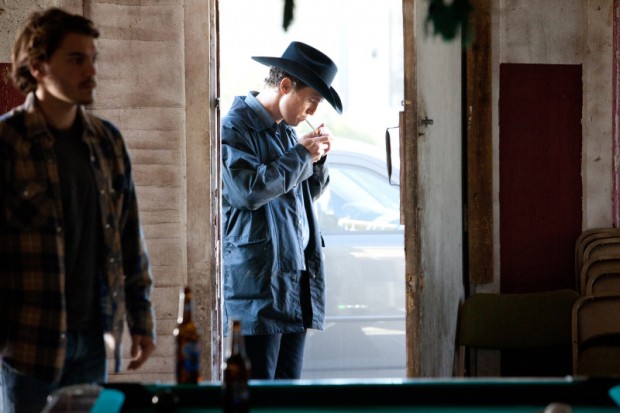
And I like that – taking those risks and not trying to be pretty.
GG: No, you can’t worry about that. I think the only time I ever tried to look good was when I’m in the bedroom in the hotel room with Rex because it’s the only time she really feels happy in the movie. She’s with her guy, so of course you’re going to try to make some sort of effort. I think the rest of the times she’s just trying to get through.
EH: Plus, it’s not hard to look bad and to be willing to take risks to look bad when you have Friedkin standing over you with a bucket of blood – literally, like dumping it onto you himself. [Laughs.] He loved splattering the blood on himself. [Laughs.]
GG: And in fact, yeah, the look – because I remember originally we weren’t going to have any makeup or hair, he’s like, “No, we have no time for hair and makeup!” [But] I was like, “Okay, no, we need to have some hair and makeup,” just because I actually wanted to make myself look kind of as raw and gnarly as possible. I said, “Trust me, a little blue and a little pink” – weird colors to make her look…I just wanted to make her look hard and I think she’s trying to look nice. Our aesthetics our different, [and] I don’t mean to judge her. But, you know, he wanted things to be like, it’s not like you had time.
EH: But all the makeup that I saw, I liked that [Gina’s character] Sharla put the makeup on. I thought that that was like kind of part of her pheromone charm, you know? She tricks [Thomas Haden Church’s character] Ansel with some makeup.
For some of the tougher scenes, did you all do multiple takes on them? Or was it pretty much a one-take kind of deal?
GG: We were lucky throughout the whole thing to get a second take. I think I asked for a second take once and he was like, “Oh, really?” [Laughs.] And it’s like a really difficult scene, so I did it, and he’s like, “See, it was the exact same as the first. Let’s just move on.” [Laughs.] I mean, did you get two takes ever?
EH: Sometimes. Most of the time he definitely prefers one, and most of the time we’d use the one take. And then I remember there was one scene where I come in after the chicken bone scene and I come in to the trailer and I was waiting outside the trailer and I was like, all of sudden, I knew there was a glitch in the matrix. And I knew when I walked in that I wasn’t going to remember my line, and I was just like, “Oh, fuck.” [Laughs.] They were like, “Action,” and I was like, “Oh, here I go.” [Laughs.] And Friedkin was just like, “Mo!” And he took me outside, and I had had three days off, and he said, “That’s the last time you get three days off.” [Laughs.]
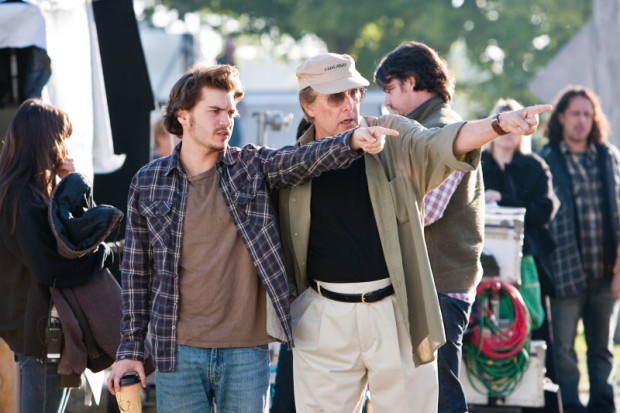
GG: Yeah. He really was like, “By the time I get on set, I want to be able to take a nap. We’re doing one take and then we’re going to get out. There’s a game on at six, and we’re out of here.” [Laughs.] And you think he’s joking, but he’s not joking. [Laughs.] But he was right at the end of the day. Certain scenes, obviously, I didn’t even want to think about it. I thought, “Let’s just do it,” and I was going to do it all the way, because I definitely didn’t want to do it again. The chicken bone thing, I didn’t want to think about, to be honest. We did it and I was like, “Was that cool?” And he said, “Yeah, we can move on,” and I thought, “Great. Let’s just move on and we’ll never discuss it again.” [Laughs.]
EH: What’s kind of crazy is that as actors this is pretty difficult material for everybody, but we got kind of lucky — in a certain sense, especially you, Gina — because we worked with a director who only really likes to do one take. But at the same time, this is kind of coming from material that’s been tried and tested for on Broadway, and you know, you should talk to one of the Sharlas who did it for eight times a week for, like, a couple months because she’d be like, “Oh, you get used to that bone.” [Laughs.]
GG: I would never get used to the bone. [Laughs.] In fact, when this was first presented to me, it was as a play. Tracy [Letts] came to me to do the play as Sharla. And I literally thought – I got to that scene and I thought, “There’s literally no way in hell I’m doing this eight times a week.” I just, I thought I couldn’t go there. [But] even just living in that situation. And it was interesting because we shot it in sequence, [which] was to Billy’s credit. And we almost had to. And just those few days, when we were in that last scene – which took a couple days, by the time we got through it – I just felt so shitty. You just feel like, “I couldn’t live like that for six months, eight shows a week.” I couldn’t do it, so my hat’s off to them. But then, of course, it bugged me that I couldn’t do it, so when it came up again I was like, “Ugh, finally I could do [it].” But, yeah, once was enough. [Laughs.]
Had you seen the show on stage? How did you breath life into them, because I feel like the characters were so unique and so gritty – had you seen other people’s portrayals of those characters?
GG: No. I actually never saw. I wanted to, but I never did. I never like to see – if I’m going to do something that’s been done, I don’t want to see it. If I’m playing music, I don’t want to hear other music of the time. I start mimicking things too easily.
EH: Especially if the other performer is kick-ass, too. Like, I heard that Michael Shannon originated the Chris part that I played and I was like, “I don’t want to see him do it.” [Laughs.] He’s so good, you know? I’ll just end up doing a weird Michael Shannon impression. [Laughs.]
GG: Tracy writes such amazing characters. Every time, you could keep reading this and reading this and reading this – it just keeps revealing itself the more you read it. And if you just kind of tap in to their psychology and where these people are coming from…And we had a great cast, so you kind of trusted everyone doing their thing. And Billy just infuses you with the feeling of like, “Go for it.” He puts us in a safe environment, because he’s taking care of all the other stuff. I mean, I don’t know, I think we all just tapped into these people and just [did] it.

I loved your relationship with Thomas Haden Church. He’s so funny. And then that transition when he’s basically realizing that you’re a complete scumbag and he wants nothing to do with you.
EH: “Made your bed.” [Laughs.]
GG: But it’s true, that’s an important line, because I think your character made your bed, my character made my bed. There’s a cause and effect. I kind of look at it sometimes as like a little bit of a morality tale. You do bad things, bad things are going to happen to you. It’s kind of instant karma. The story of karma – I think it should be rated G for all the children to see. [Laughs.] These people are – and I never like labeling anyone as like a bad person – but they’ve made some dumb choices that have really, obviously affected people in very negative ways. And I do believe in karma. I think that it comes back to you, and I think we see that.
And then he’s so funny on top of that, too. To play off of that – the seriousness of it, and then –
GG: He’s so funny, yeah. Sometimes I couldn’t look at him – like, I wanted to laugh, so I just had to turn it into disgust instead. [Laughs.] Because really, he’d look like a big orangutan or something, and it was so funny.
His facial hair – was that real? Because I saw it and it almost grew on his neck. [Laughs.]
EH: It was real. That’s just the way his stuff grows. [Laughs.] He kind of reminded me in certain scenes of like those cavemen in the insurance commercials. [Laughs.]
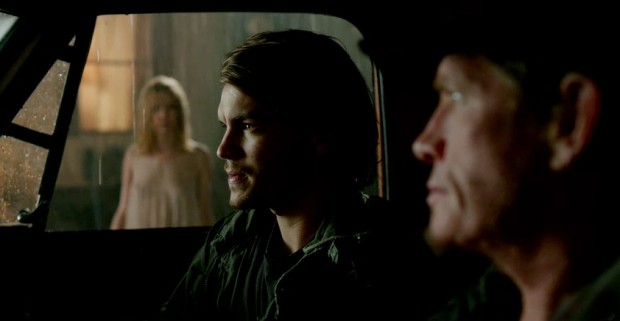
Do you feel like the long scenes and the one takes made the movie relate to the show in any way? To sort of bring back the stage to the screen?
EH: There was definitely a feeling of live performance that’s probably similar to theater. Gina would know a lot more about this than me because I haven’t really done a lot of theater. But in the sense of you feel like this is your one take, yeah. This is like your one chance to do it.
GG: Well, I have to say, right after I did this movie – not right after, a couple months later – I did another movie that weirdly took place in Texas in almost a trailer thing. I was like, “What’s going on?” [Laughs.] And it was very, very long scenes. But the difference was, we would do the long takes, and it made me realize how, in order to do those scenes like that – that long – you can act it, but unless you have a brilliant director, it’s going to fall flat. There’s a reason why when you do a play, you can’t film it, because it always just feels very flat. And he moved the camera around in such a way that it kept it going and the energy was there. Because when I saw the other movie that I did, there’s great scenes, there’s great writing – you know, the acting’s great – but it felt really flat because the camera didn’t move in a way to keep it kinetic. So I think that’s always the tricky part in making a stage thing into the cinema thing. It just, something doesn’t work. And you were never aware that this was one, long, big take. It felt good, though, because we got to rehearse whole scenes and it felt like a complete thing and you felt like you wanted to…he kind of let us go.
EH: Yeah. I loved the way he was moving the camera – him and Caleb Deschanel, the DP, who is just like this baller. And it’s interesting how varied the shots in the trailer are. And they were really smart because they built the trailer on a stage, so they would be able to pull out walls at times and get shots that would’ve been a lot harder to do if you shoot it in the real space.
But it still felt very cramped. It still felt very –
EH: Yeah.
GG: Well Caleb, you know, is just like a genius. He’s one of the best DPs out there. But Billy, you realized how masterful he was because he’d be like, “Okay, so back there should be yellow, here should be blue, the camera’s going to move,” and he could really see it.
EH: Yeah. He like color-coordinated it.
GG: Yeah, but that’s really rare, it’s like old school – the way you think about how directors should be.
EH: The classic story with Caleb and Billy is like this truck pulls in and then Caleb’s like, “Cut!” And Billy says, “Cut!” Caleb goes, “Billy, we can’t use the shot, there’s reflections all on the truck. You can see the camera.” And Billy goes, “Who gives a shit?” [Laughs.] “Move the fucking camera.” [Laughs.] “Audiences know films are shot with movie cameras.” [Laughs.]
GG: That’s what you got to love about him, you know?
EH: He said that a couple times, like we’d [bring] up continuity and he’d say, “Who gives a shit?” And you’re like, “Oh, uh, I don’t.” [Laughs.] “Not me.” [Laughs.] Yeah, I think there’s a certain glee that he has in kind of breaking the rules. You know? He loves the reflections in there and he’s like, “I don’t care.” Everyone’s going to get their panties in a [bunch] but me.
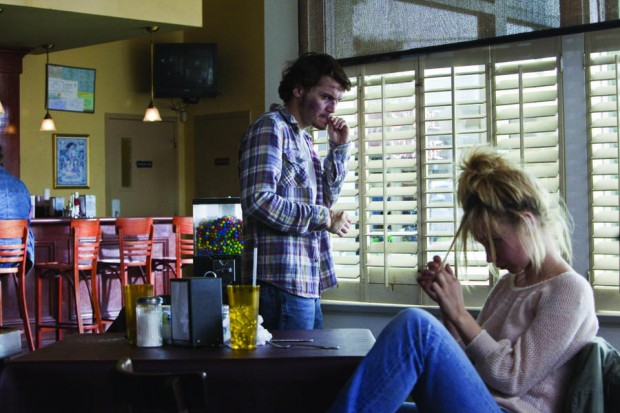
Did you all look for some of those scenes where there are – ?
EH: I could never find them, actually.
GG: I know, I feel like I missed the truck reflection. Where was it?
EH: I never looked, though. Maybe that’s why the CGI budget was like $10 million on this movie. No, I’m kidding. [Laughs.]
How did you all each get attached to the picture?
GG: I got attached…I was lucky because I think they were looking at a bunch of actresses – of course at the time I didn’t know it, because they don’t tell you anything – and then Tracy said to Billy, “You really should get Gina.” Because Tracy had wanted me to do it earlier on. And then I met Billy – I got this call saying, “Friedkin really wants to see you.” And I was like, “Oh, great.” And then I got the script and started reading and I went, “It’s that script with that damn chicken bone scene.” [Laughs.] I thought, “Oh God.”
And I just went and I met with Billy and we spoke and I was telling him a story about this snake, about how I was dealing with a poisonous snake and I had had this whole encounter. I don’t know why I was obsessed with this snake thing, and at the end of the story – which I just told him because I was obsessed with the story because it had just happened – he said, “I don’t know how you know about this character, but you’re perfect. You should do this story.” [Laughs.] And I was like, “Really, that’s it? Yeah, I can. I can do it.”
EH: I just got the call and was super excited to meet Billy. And then I met him and I guess passed whatever weird test he was putting me through. [Laughs.]
GG: Yeah, he’s just so instinctual. He’s like, “Listen, casting is my job. After I’m casting I can take a nap.” [Laughs.] But he’s kind of – he’s right. So many movies I think studios cast some name and they’re not right and it just doesn’t matter how good of an actor they are – they’re not right. You’re going against the material.
EH: Yeah, he’s really good at casting.
GG: He’s amazing, [and] that is, like I say, 90 percent of directing – casting the right part and trusting your actors. But he’s so good, so he can listen to himself.
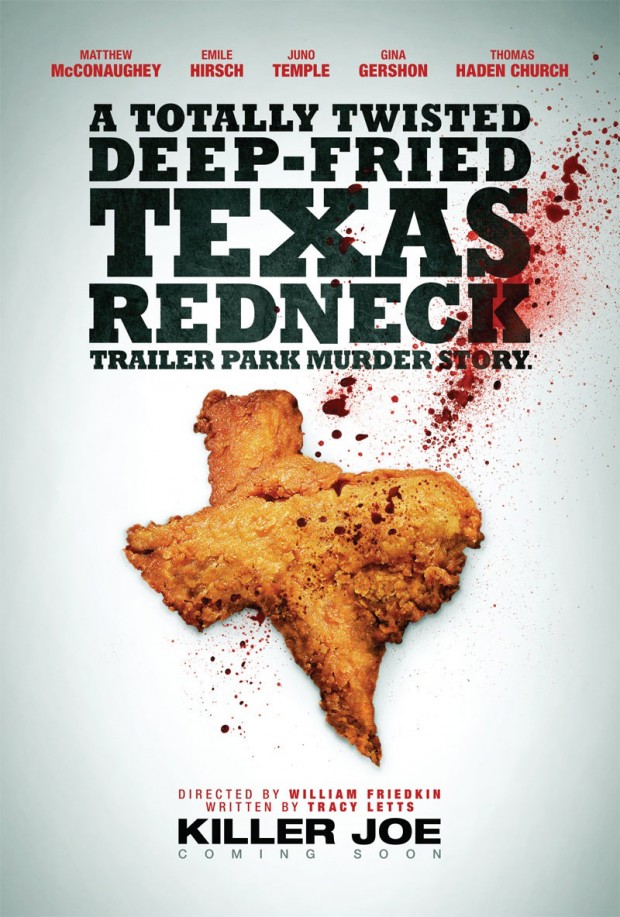
Killer Joe hits limited release on Friday, July 27th.

